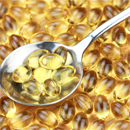 Everyday activities, as well as exercise, can cause the cell membranes of your muscles to tear which can lead to inflammation and muscle soreness. Many people reach into their medicine cabinets for pain killers or anti-inflammatory pills to deal with inflammation and muscle soreness, but what if there was a Vitamin that could help? New research from Georgia Health Sciences University shows that Vitamin E is essential for muscle repair.
Everyday activities, as well as exercise, can cause the cell membranes of your muscles to tear which can lead to inflammation and muscle soreness. Many people reach into their medicine cabinets for pain killers or anti-inflammatory pills to deal with inflammation and muscle soreness, but what if there was a Vitamin that could help? New research from Georgia Health Sciences University shows that Vitamin E is essential for muscle repair.
Muscle soreness and inflammation often prevent people from carrying on with their normal daily activities. Without proper muscle repair, muscles will eventually waste away and die. Previous research in animals has shown that Vitamin E deficiency is linked to muscle problems, but the way in which it is connected is not known. The researchers from the recent study at Georgia Health Sciences University believe that they now know, at least in part, how Vitamin E works for muscle repair.
Advertisement
How Does Vitamin E Work to Help with Muscle Repair?
Vitamin E is a fat-soluble vitamin and is an antioxidant. It is believed that its’ antioxidant properties aid with muscle repair by removing destructive by-products from the body. Because Vitamin E is fat-soluble it can actually attach itself to the muscle membrane to prevent free radical damage. It also helps to keep a major membrane component, phospholipids, working properly so that they work effectively after a tear occurs in the muscle. Increasing Vitamin E intake either with food sources or supplements may have a positive effect on people suffering from muscle soreness.
What is quite interesting is that diabetic patients have difficulty with muscle repair and typically complain of muscle weakness. Increasing Vitamin E intake in diabetic patients may help them with muscle soreness and fatigue. Further research is needed in this area to determine the possible benefits and side effects of Vitamin E supplementation in the diabetic population.
What Effect Does Vitamin E Have on Inflammation?
Many individuals use Vitamin E ointment or cream on the skin after sun exposure to help soothe the skin and prevent inflammation. There has been research conducted in the past which has supported the role that Vitamin E plays in preventing skin inflammation after exposure to the sun. Previous research has shown that topical Vitamin E can reduce signs of skin inflammation including: redness, itchiness, swelling and temperature.
Further research should look at whether Vitamin E can not only help with muscle repair but whether it has an effect on deep tissue inflammation as well as skin inflammation. It is possible that Vitamin E alone or in combination with other vitamins or minerals, may have a positive effect on both muscle soreness and inflammation.
Where is Vitamin E Found?
Vitamin E can be found in a variety of foods including:
– Vegetable oils
– Nuts and seeds
Advertisement
– Dark green leafy vegetables
– Fortified foods including cereal, juices, margarine and some spreads
Additionally, Vitamin E can be taken in a supplement form. While eating foods with Vitamin E pose little to no risk to most people, adding Vitamin E, in high doses, via a supplement can have side effects. Side effects to taking a Vitamin E supplement include increased bleeding risk and increased risk of bleeding in the brain. If you are pregnant, taking a Vitamin E supplement may also increase the chance of a birth defect. It is advised that you speak to you doctor before adding a Vitamin E supplement into your daily routine to protect yourself from possible adverse effects.
